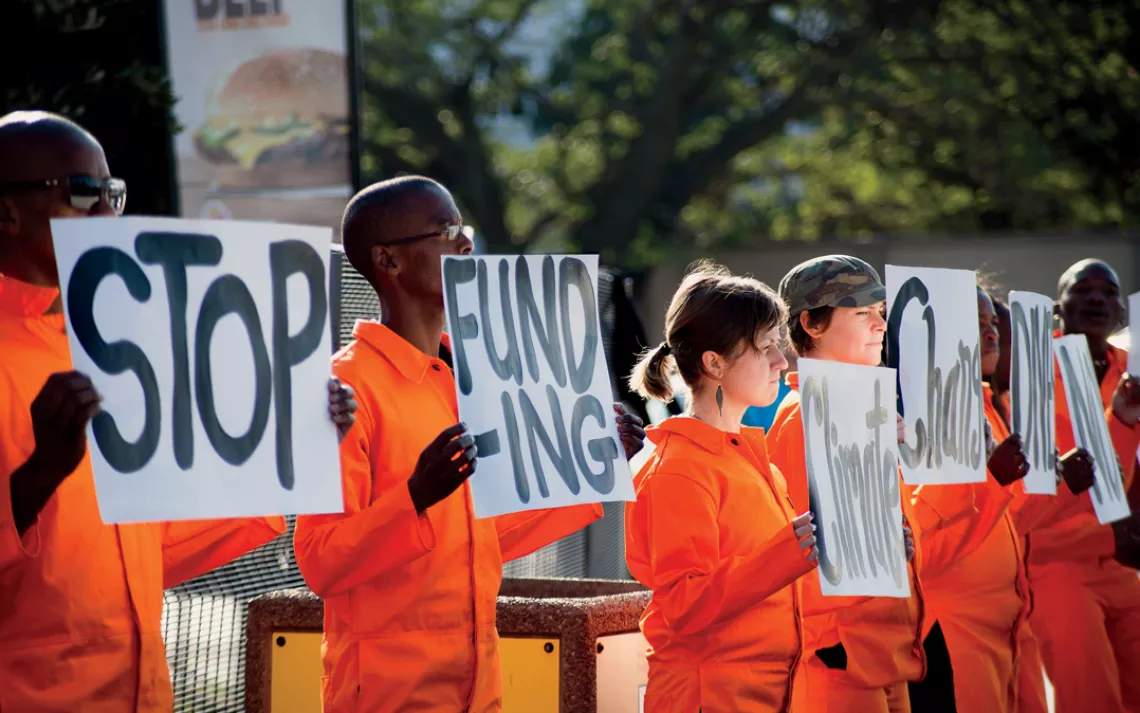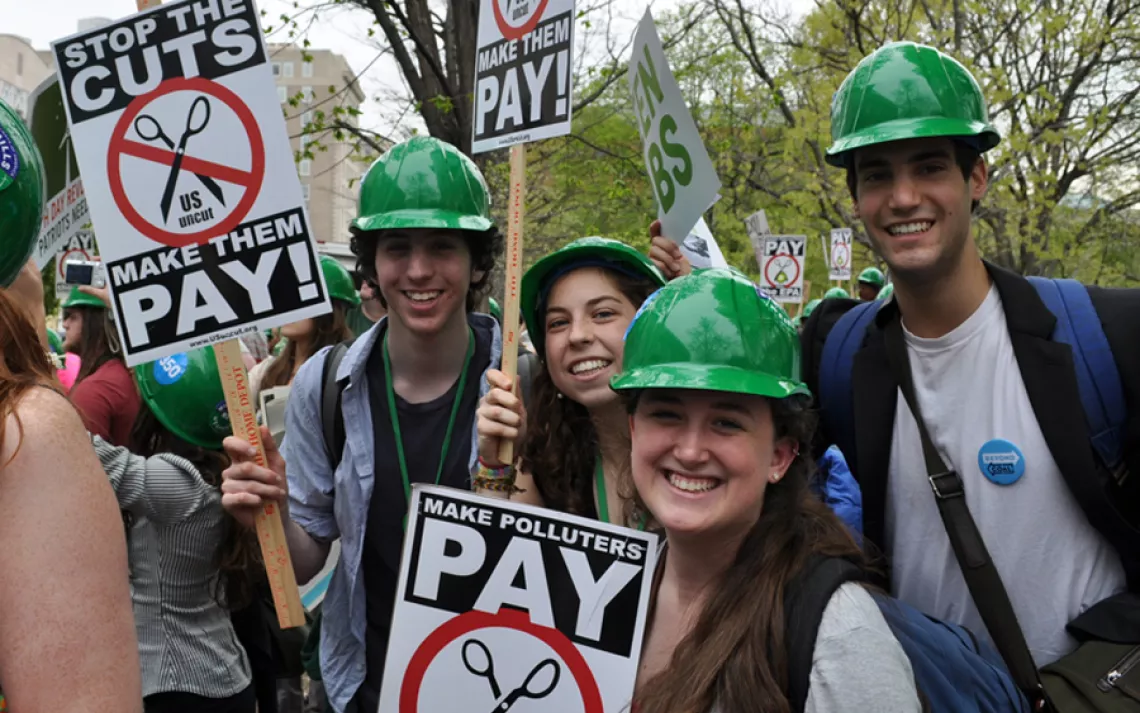Divestment Goes Global
The student movement to defund the fossil fuel industry graduates and goes to work.

As part of a Global Divestment Day, 350Africa.org activists demonstrate outside Standard Bank in Johannesburg, South Africa. | Photo courtesy of 350Africa.org/Shayne Robinson
WHEN CHLOE MAXMIN RETURNED to Harvard for her sophomore year, she was on a mission to get her university to divest its endowment from the fossil fuel industry. She had read Bill McKibben in Rolling Stone arguing that efforts to stop climate change relied too heavily on legislators who were under the influence of coal, oil, and gas corporations. The only remaining option, McKibben wrote in his 2012 article, was to build a grassroots campaign similar to the antiapartheid movement of the 1980s, to deny institutional funding to the fossil fuel industry. At that time, only a handful of campus divestment groups existed. Swarthmore College students had started a campaign as early as 2010, and the Sierra Student Coalition had helped jump-start robust campaigns at the University of North Carolina and the University of Illinois as a part of its Beyond Coal campaign.
Maxmin founded Divest Harvard with two other students and within months held the first campus-wide referendum on divestment, with a majority of students voting in favor of their administration divesting. Scores of other students around the country heeded McKibben's call to action, organizing sit-ins, demonstrations, and letter-writing campaigns. By mid-2012, activists had begun collaborating on a national level through groups like the Divestment Student Network.
Many pioneers of the campus divestment movement are still doggedly working to get their administrations on board, but nationally the campaign has achieved impressive results. Nearly 30 universities, including Stanford, the New School, and San Francisco State University, have begun divesting their endowments from fossil fuel companies. What's more, in the process of organizing their campuses, student activists have sparked a broader divestment movement that has gone global.
Katie McChesney, formerly a student climate activist at Capital University in Ohio and now a full-time organizer for Fossil Free, says that students knew from the start that the divestment movement couldn't be limited to faculty senates and boards of trustees. A key victory occurred in November 2014, when Cambridge Associates, the largest global consultant on college endowments, publicly stated that it would no longer oppose divestment and would identify fund managers who could design fossil-free portfolios for universities. "That's when students recognized the power that they had to pressure not just their own universities but other institutions, and the ripple effects that would have," said McChesney.
Those ripple effects are now spreading across all sectors of society and around the world. In the past two years, more than 200 institutions spanning finance, religion, private enterprise, philanthropy, and local government have divested from fossil fuels, including the Episcopal Church, the Church of England, the Rockefeller Brothers Fund, and the cities of Minneapolis, Seattle, Oxford, and Dunedin.
In what is considered the largest single act of divestment to date, the government of Norway voted in May to divest any holdings in companies that gain more than 30 percent of their income from coal-related activities. The move was important both symbolically and financially, as the nation was formerly one of the top 10 investors in coal. Truls Gulowsen, the head of Greenpeace Norway, says, "This change in Norway happened very quickly because of a combination of public opinion, common sense, and some very good arguments that divestment from coal is a financially prudent approach."
Worldwide, there are more than 500 active campaigns urging divestment. In February, a faith-based consortium kicked off a high-profile campaign calling on Pope Francis to urge divestment for all religious and civil groups. In March, Alan Rusbridger, the then editor in chief of the Guardian, launched the Keep It in the Ground campaign, asking the world's two biggest charitable funds, the Bill & Melinda Gates Foundation and the Wellcome Trust, to divest their fossil fuel investments.
Divestment as a tactic to address global warming has its skeptics, who point out that as soon as one party divests, another will simply take its place. Climate professor Mike Hulme of King's College London dismisses divestment as "feel good campaigning" and says that as a policy tool to confront global temperature rise, it is misguided.
Yossi Cadan, senior divestment campaigner at McKibben's 350.org, says such critics misunderstand divestment. The goal is not so much to undermine the fossil fuel industry's bottom line—a task that is so complex it's unlikely to happen—as it is to remove the social license that allows the industry to operate with impunity. As with the earlier divestment campaign against companies doing business with apartheid South Africa, success is measured in symbolic victories that eventually translate into a stigma attached to investing in fossil fuels.
"You don't have to look far to find evidence that it's working," says Cadan. "The fossil fuel industry is really getting anxious. The fact that the Koch brothers sent a full lobby delegation to the Vatican speaks volumes."
Mark Campanale is the executive director of Carbon Tracker, a U.K.-based think tank that analyzes carbon investment risk. "Without a doubt, it's forced Wall Street and City types to wake up and pay attention. If you're a fund manager and you never hear from the clients, pension funds, or charities you manage, then suddenly you get letters asking you what's going on with fossil fuel investment, you're going to worry."
Indeed, in April, British bank HSBC released a report warning investors that fossil fuel could quickly become a "stranded asset" due to changing regulations and that there were "reputational as well as economic risks to staying invested."
Maxmin graduated from Harvard last May and is now a full-time climate activist. "Divestment as a tactic was really underestimated when the movement first began," she says. "Almost everyone is part of an institution—your alma mater, your city's pension fund, a religious organization—that has something to divest. That sets the foundation for an incredibly broad-based movement with a lot of support for students, who are really at the heart of it."
 The Magazine of The Sierra Club
The Magazine of The Sierra Club



